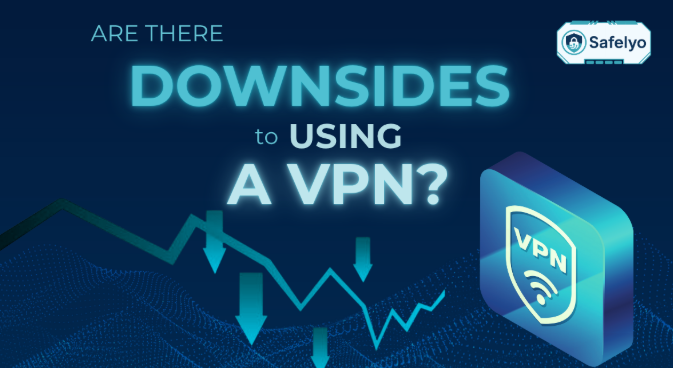When VPNs first became mainstream, they were often marketed as all-in-one privacy solutions, tools that could instantly make you anonymous and secure online. But like most technologies, the reality is more nuanced. VPNs can be incredibly useful, but they’re not without their flaws.
So, are there downsides to using a VPN? As you’ll discover in this guide, the answer is yes but understanding those downsides will help you get more from your VPN while avoiding common frustrations.
In this guide, you’ll learn:
- What common downsides VPN users face, from speed drops to blocked websites
- Why VPNs still make sense for privacy and security in many situations
- How to overcome or reduce the most frustrating VPN limitations
- Frequently asked questions about VPN performance, safety, and legality
Let’s start by exploring the biggest question: are there downsides to using a VPN, and what should you really expect?
1. Are there downsides to using a VPN?
At Safelyo, we’re committed to helping users make informed decisions about their online privacy. Michale Dang, our Chief Technology Officer and the expert behind Safelyo’s privacy testing systems, often reminds users that while VPNs offer valuable protection, they’re not a one-size-fits-all solution. Many people assume that turning on a VPN means complete anonymity, but that’s far from the full story.
In reality, VPNs come with certain limitations that can affect how you browse, stream, and access online services.If you’re considering a VPN or already using one, it’s important to understand what these drawbacks look like in everyday use. Let’s explore some of the most common downsides you might encounter.
1.1. Slower internet speeds
When you connect to a VPN, your internet traffic is encrypted and rerouted through a secure server. This extra layer of encryption and rerouting introduces latency, especially if the server is geographically distant. As a result, your browsing, streaming, or downloading speed may drop. Premium VPNs often optimize their networks to reduce this impact, but slower speeds are still a common side effect.
1.2. Access issues with some websites
Many websites and services actively block VPN traffic. Streaming platforms like Netflix or Hulu use VPN-detection technologies to enforce content licensing rules, which can lead to proxy errors. Banking apps and government portals may flag VPN use as suspicious behavior, resulting in login failures or locked accounts.
1.3. VPNs don’t make you completely anonymous
While a VPN hides your IP address and encrypts your traffic, it doesn’t prevent other tracking methods. Websites can still identify users through cookies, browser fingerprinting, or behavioral patterns. If you log in to your personal accounts while using a VPN, your real identity can be tied back to your activity.
1.4. Trust issues with VPN providers
Not all VPN providers are created equal. Some log user activity despite claiming not to, or sell anonymized data to advertisers. Free VPNs often monetize through invasive ads or questionable partnerships. Choosing a trustworthy provider with a transparent privacy policy is essential.
1.5. Device or app compatibility
VPNs don’t always work across all platforms. Some smart TVs, game consoles, or older operating systems may lack native VPN support. Setting up a VPN on these devices might require technical workarounds like router configuration or Smart DNS, which can be complex for average users.
1.6. Legal and policy risks
Using a VPN can be legally restricted or outright banned in certain countries. In places like China, Russia, or the UAE, VPN use may violate national laws and lead to fines or other penalties. Even in countries where VPNs are legal, using them to access restricted content might breach terms of service agreements and result in suspended accounts.
2. When does a VPN still make sense?
Despite its drawbacks, a VPN remains a valuable privacy tool in many situations. Here’s when using a VPN continues to offer clear benefits:
- Protects your data on unsecured public Wi-Fi networks, such as in cafes or airports
- Bypasses geo-blocks, letting you access websites and content restricted in your region
- Prevents internet service providers (ISPs) from monitoring or throttling your traffic
- Encrypts communications for remote workers accessing sensitive company data
- Adds an important layer of privacy when combined with secure browsers and tracking blockers
In other words, a VPN is still one of the most accessible and powerful tools for improving digital privacy, especially when used as part of a larger strategy. If you’re looking for a trustworthy VPN provider to get started or upgrade your setup, check out best VPN. It’s a great starting point to find reliable services that prioritize speed, security, and transparency.
3. How to minimize VPN drawbacks?
While asking “Are there downsides to using a VPN?” is valid, many of those issues can be reduced or eliminated with the right steps. Here’s how to enhance your VPN experience:
- Pick a reputable VPN provider: Look for one with a proven no-logs policy, fast servers, and transparent ownership.
- Avoid free VPNs: These often compromise privacy to make money through ads or data sales.
- Use built-in features wisely: Enable DNS leak protection, kill switches, and obfuscation features when available.
- Improve browser hygiene: Regularly delete cookies, use incognito/private mode, and install anti-tracking extensions.
- Install on the right devices: Set up VPNs directly on routers or use apps that are officially supported by your device.
- Stay informed: Understand your country’s VPN regulations and keep your software up to date.
By taking these precautions, users can significantly improve their VPN’s performance and reliability.
4. FAQs: common questions about VPN downsides
While VPNs offer many benefits in terms of privacy and security, they also raise common concerns among users. Below are some frequently asked questions about the potential downsides of using a VPN, along with clear answers to help you make informed decisions.
4.1. Will a VPN always slow down my internet?
Not always. A good VPN with fast servers may only cause minimal slowdowns. However, speed reduction is common when connecting to distant or overloaded servers.
4.2. Are free VPNs safe to use?
Most free VPNs are not safe. They often come with limitations, show ads, or collect and sell user data. It’s better to invest in a reputable paid service.
4.3. Can websites block VPN users?
Yes. Many services use techniques to detect and block VPN traffic. Using obfuscated servers or switching to less-known VPN IPs can help bypass these blocks.
4.4. Does a VPN replace antivirus software?
No. A VPN encrypts your connection but does not protect you from malware, phishing, or viruses. You still need antivirus and safe browsing habits.
5. Conclusion
Using a VPN can significantly improve your online privacy, but it’s not without limitations. From slower speeds to blocked content and potential trust issues with providers, VPNs aren’t the perfect solution many people imagine. However, if you understand these downsides and take steps to address them, a VPN remains one of the best tools for staying secure in an increasingly connected world.
Here’s what to keep in mind:
- VPNs may reduce your internet speed, especially on distant or crowded servers.
- Some websites and apps block VPN traffic, particularly streaming or financial services.
- A VPN hides your IP but doesn’t stop cookies, trackers, or logins from identifying you.
- Free VPNs often compromise your privacy for trusted, paid providers.
- You can reduce most issues by adjusting settings, using extra privacy tools, and staying informed.
Knowing the limitations of a VPN before you rely on one can help you avoid frustration and make smarter privacy choices. For more practical guides like this, visit the Privacy & Security Basics section on Safelyo and take charge of your digital safety.



































